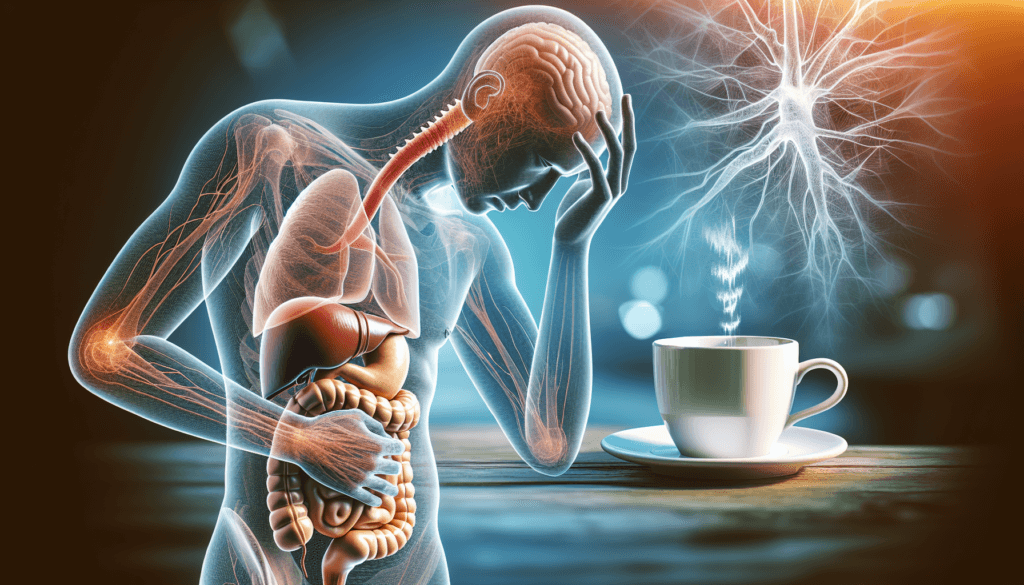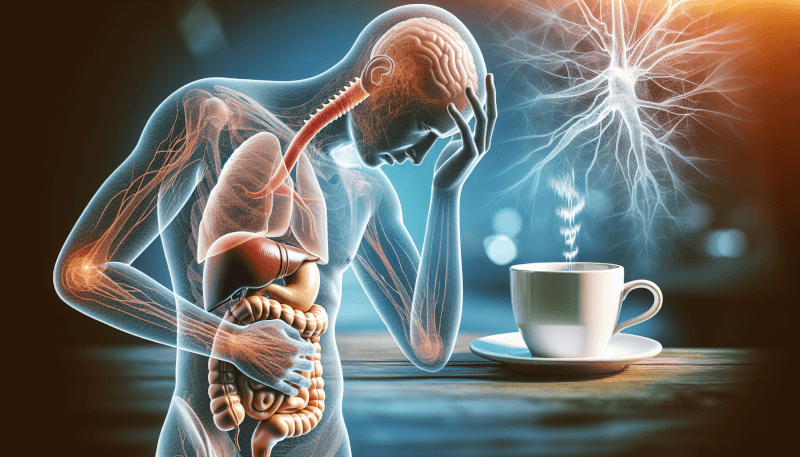Imagine starting your day with a hot cup of coffee, skipping breakfast, and rushing off to work. Many people follow this routine, but have you ever wondered what impact it has on your body? In this article, we will explore the consequences of drinking coffee every day without consuming any food. From jittery energy bursts to potential digestive issues, we’ll uncover the effects that this habit can have on your overall well-being. So, next time you reach for that steaming mug, make sure to consider the potential consequences.
Negative Effects of Drinking Coffee Without Eating
Increase in Stomach Acid
Drinking coffee on an empty stomach can lead to an increase in stomach acid production. This is because coffee contains compounds that stimulate the production of gastric acid, which can irritate the lining of the stomach and lead to symptoms such as heartburn or indigestion. In the long term, excessive production of stomach acid can contribute to the development of conditions like gastroesophageal reflux disease (GERD).
Digestive Issues
Consuming coffee without any food in your stomach can result in various digestive issues. One potential issue is gastritis, which is inflammation of the stomach lining. The acidic nature of coffee can inflame the stomach lining, causing discomfort, bloating, and even nausea. Additionally, drinking coffee without eating can cause gastrointestinal upset, leading to symptoms like stomach cramps, gas, and even diarrhea.
Dehydration
Coffee is well-known for its diuretic effect, meaning it increases urine production and subsequently leads to fluid loss. When coffee is consumed on an empty stomach, this diuretic effect can be exacerbated, potentially increasing the risk of dehydration. Dehydration can cause symptoms such as fatigue, dry mouth, dizziness, and even confusion. It is crucial to stay hydrated by drinking water in conjunction with coffee consumption, especially when skipping a meal.
Increased Anxiety and Jitters
Coffee contains caffeine, a stimulant that can have profound effects on the central nervous system. When consumed on an empty stomach, caffeine is rapidly absorbed into the bloodstream, leading to a sudden surge in energy and alertness. However, this can also result in increased anxiety and jitters, as caffeine stimulates the release of stress hormones like adrenaline. These effects can be particularly pronounced when coffee is consumed without any food to help buffer the stimulating effects of caffeine.
Reduced Nutrient Absorption
Drinking coffee without eating can interfere with the absorption of essential nutrients. Coffee contains compounds called polyphenols, which can bind to certain minerals like iron, calcium, and zinc, making them less available for absorption in the digestive tract. Over time, inadequate absorption of these minerals can contribute to deficiencies and impact overall health. Additionally, coffee can impair the absorption of vitamins, further compromising nutrient status.
Impact on Blood Sugar Levels
Coffee consumption on an empty stomach can have negative effects on blood sugar control. Caffeine has been shown to decrease insulin sensitivity, potentially leading to insulin resistance over time. Insulin resistance is a condition characterized by the body’s decreased ability to respond to insulin, resulting in elevated blood sugar levels. This can have significant implications for individuals with diabetes or those at risk of developing the condition.
Sleep Disturbances
Consuming coffee without eating can disrupt sleep patterns and contribute to difficulties falling asleep or staying asleep. The stimulating effects of caffeine can interfere with the natural process of winding down before bed. Even if you manage to fall asleep, the quality of your sleep may be compromised, leading to feelings of fatigue and daytime sleepiness. It is recommended to avoid coffee within several hours of bedtime to promote restful sleep.
Elevated Heart Rate and Blood Pressure
Drinking coffee without eating can lead to a temporary increase in heart rate and blood pressure. Caffeine stimulates the release of adrenaline, which can cause these physiological responses. While these effects are usually short-lived, regularly consuming coffee on an empty stomach can potentially contribute to long-term issues with elevated heart rate and blood pressure, especially in individuals who are already prone to these conditions.
Dependency and Withdrawal Symptoms
Regularly drinking coffee on an empty stomach can lead to dependency, as the body becomes accustomed to the effects of caffeine. This dependency can result in withdrawal symptoms when coffee is not consumed, including headaches, irritability, and fatigue. To avoid becoming dependent on caffeine, it is important to moderate coffee consumption and consider incorporating a balanced meal before having your daily coffee.
Weakened Immune System
The consumption of coffee on an empty stomach can have a negative impact on the immune system. Caffeine has been shown to suppress immune function, making the body more susceptible to infections. This can manifest as increased frequency or severity of common illnesses, such as colds or the flu. To support a strong immune system, it is advisable to have a meal along with your coffee to minimize the potential immune-suppressing effects.
Causes and Risks of Drinking Coffee on an Empty Stomach
Increased Stomach Acid Production
One of the main causes of increased stomach acid production when drinking coffee without eating is the presence of chemical compounds called chlorogenic acids. These compounds are found in coffee and can stimulate the release of gastric acid. The resulting increase in stomach acid can lead to discomfort and irritation, particularly for individuals with sensitive stomachs or pre-existing stomach conditions.
Delayed Gastric Emptying
Drinking coffee on an empty stomach can delay gastric emptying, which is the process by which the stomach empties its contents into the small intestine for further digestion and absorption. When coffee is consumed without any accompanying food, it can slow down the rate at which the stomach empties, leading to feelings of fullness and potentially exacerbating symptoms such as bloating or indigestion.
Risk of Developing Gastritis and Ulcers
The combination of increased stomach acid production and delayed gastric emptying can increase the risk of developing gastritis and ulcers. Gastritis is an inflammation of the stomach lining, which can be caused by the corrosive effects of excess stomach acid. Ulcers, on the other hand, are open sores that can form in the lining of the stomach or the upper part of the small intestine. Both conditions can be painful and may require medical intervention.
Impaired Nutrient Absorption
Consuming coffee without eating can impair the absorption of essential nutrients, as mentioned earlier. When nutrients are not properly absorbed, the body may not receive an adequate supply of vitamins and minerals necessary for optimal health. Over time, this can lead to deficiencies, weakened immune function, and an increased risk of chronic diseases.
Negative Impact on Blood Sugar Control
Drinking coffee on an empty stomach can negatively impact blood sugar control, particularly for individuals with diabetes or those at risk of developing the condition. Caffeine has been shown to decrease insulin sensitivity, impairing the body’s ability to utilize glucose effectively. This can lead to elevated blood sugar levels, potentially contributing to the development or progression of diabetes.
Aggravation of Anxiety and Stress Responses
Coffee consumption on an empty stomach can aggravate anxiety and stress responses, as caffeine stimulates the release of stress hormones like adrenaline. This can result in increased feelings of nervousness, restlessness, and irritability. Individuals already prone to anxiety or stress may be particularly susceptible to these effects and should consider consuming coffee with a balanced meal to mitigate the potential exacerbation of symptoms.

Increased Stomach Acid
Effects of Acid on the Digestive System
Excessive stomach acid production, caused by drinking coffee on an empty stomach, can have several effects on the digestive system. The acid can irritate the delicate lining of the stomach, leading to inflammation, discomfort, and potentially even the development of ulcers. Additionally, the increased acidity can interfere with the normal functioning of digestive enzymes, impairing overall digestion and nutrient absorption.
Potential Symptoms
Increased stomach acid can result in various symptoms, including heartburn, indigestion, bloating, and a feeling of fullness. These symptoms may be particularly pronounced in individuals who already have a sensitive stomach or a pre-existing condition such as gastritis or GERD. It is essential to be mindful of these symptoms and adjust coffee consumption accordingly to minimize discomfort.
Link to Gastroesophageal Reflux Disease (GERD)
Gastroesophageal reflux disease (GERD) is a chronic condition characterized by the recurrent backflow of stomach acid into the esophagus, causing persistent heartburn and other symptoms. Drinking coffee without eating can contribute to the development or worsening of GERD symptoms due to the increase in stomach acid production. Individuals with GERD should be especially cautious about consuming coffee on an empty stomach and may need to explore alternative options.
Digestive Issues
Gastritis
Gastritis refers to the inflammation of the stomach lining, which can cause discomfort and digestive disturbances. Drinking coffee without eating can exacerbate the risk of developing gastritis due to the irritant effect of stomach acid on an empty stomach. Symptoms of gastritis may include abdominal pain, bloating, nausea, and loss of appetite. It is advisable to avoid consuming coffee on an empty stomach if you have a history of gastritis or are prone to stomach sensitivity.
Gastrointestinal Upset
Coffee consumed on an empty stomach can lead to gastrointestinal upset, resulting in symptoms such as stomach cramps, gas, and even diarrhea. The combination of increased stomach acid production and the absence of food to buffer its effects can disrupt the delicate balance of the digestive system, leading to discomfort and bowel irregularities. If you experience gastrointestinal upset after consuming coffee without eating, it may be advisable to adjust your coffee routine.
Diarrhea
Drinking coffee without eating can trigger episodes of diarrhea in susceptible individuals. Coffee has a laxative effect, which can be enhanced when consumed on an empty stomach. The compounds in coffee, particularly caffeine, stimulate the contraction of the intestinal muscles, speeding up the movement of stool through the digestive tract and potentially resulting in loose or watery stools. If you are prone to diarrhea, it may be advisable to consume coffee with a meal to minimize this effect.

Dehydration
Diuretic Effect of Caffeine
Coffee is a well-known diuretic, meaning it promotes the excretion of water from the body through increased urine production. This diuretic effect is primarily attributed to caffeine, which is a natural stimulant found in coffee. Consuming coffee on an empty stomach can intensify the diuretic effect, potentially leading to increased fluid loss and a higher risk of dehydration. It is important to compensate for the fluid loss by drinking water alongside coffee consumption.
Symptoms and Risks of Dehydration
Dehydration can cause a range of symptoms and can have serious health implications if left untreated. Some common symptoms of dehydration include increased thirst, dry mouth, dark-colored urine, fatigue, dizziness, and confusion. In severe cases, dehydration can lead to electrolyte imbalances, heatstroke, and even organ failure. To prevent dehydration, it is crucial to stay adequately hydrated by drinking water throughout the day and especially when consuming coffee without eating.
Increased Anxiety and Jitters
Effects of Caffeine on the Central Nervous System
Caffeine acts as a stimulant on the central nervous system, promoting alertness, elevating mood, and increasing focus. However, when consumed on an empty stomach, the effects of caffeine can be more pronounced, potentially leading to increased feelings of anxiety and nervousness. Caffeine stimulates the release of stress hormones like adrenaline, which can result in jitteriness, restlessness, and an elevated heart rate.
Symptoms of Anxiety and Jitters
Anxiety and jitters caused by coffee consumption on an empty stomach can manifest as feelings of unease, racing thoughts, increased heart rate, and a sense of restlessness. These symptoms may be more pronounced in individuals who are already prone to anxiety. If you experience these effects, it may be beneficial to consume coffee with a balanced meal to help mitigate these symptoms and promote a more comfortable experience.

Reduced Nutrient Absorption
Interference with Mineral Absorption
Coffee contains polyphenols, compounds that can bind to certain minerals in the digestive tract and reduce their absorption. Minerals such as iron, calcium, and zinc are essential for various bodily functions, including the formation of red blood cells, strong bones, and a robust immune system. By interfering with the absorption of these minerals, coffee consumed without eating can contribute to deficiencies and compromise overall health.
Impaired Absorption of Vitamins
In addition to minerals, coffee can also impair the absorption of certain vitamins, specifically water-soluble vitamins like vitamin C and the B vitamins. These vitamins play vital roles in energy production, immune function, and overall well-being. Coffee’s interference with their absorption can potentially lead to deficiencies and impact various bodily processes.
Effects on Bone Health
Adequate intake and absorption of calcium and other minerals are crucial for maintaining strong and healthy bones. When coffee is consumed without eating, the interference with mineral absorption can potentially have negative consequences for bone health. Prolonged inadequate absorption of minerals can increase the risk of conditions like osteoporosis, which is characterized by decreased bone density and an increased susceptibility to fractures.
Impact on Blood Sugar Levels
Effects of Caffeine on Insulin Sensitivity
Caffeine consumption, especially in large amounts or on an empty stomach, has been shown to decrease insulin sensitivity. Insulin is a hormone responsible for regulating blood sugar levels by facilitating the uptake of glucose from the bloodstream into the cells. When insulin sensitivity is decreased, the body’s ability to effectively utilize glucose becomes impaired, resulting in elevated blood sugar levels.
Risk for Insulin Resistance
Prolonged consumption of coffee without eating, leading to decreased insulin sensitivity, can increase the risk of developing a condition known as insulin resistance. Insulin resistance is characterized by the body’s reduced ability to respond to insulin, requiring higher levels of insulin to achieve normal blood sugar control. Insulin resistance is closely associated with the development of type 2 diabetes and other metabolic disorders.
Consequences for Diabetes Management
For individuals with diabetes, drinking coffee on an empty stomach can pose challenges for blood sugar management. The caffeine in coffee can lead to temporary spikes in blood sugar levels, particularly when consumed without any food to slow down the absorption of caffeine. Additionally, the decrease in insulin sensitivity caused by coffee consumption can complicate blood sugar control for individuals with diabetes. It is important for individuals with diabetes to work closely with their healthcare team to develop a tailored plan for coffee consumption and blood sugar management.

Sleep Disturbances
Disruption of Sleep Patterns
The stimulating effects of caffeine can disrupt sleep patterns when coffee is consumed without eating. Caffeine blocks the action of adenosine, a chemical in the brain that promotes sleep. By blocking adenosine receptors, caffeine keeps you awake and alert. When consumed in the evening or close to bedtime, coffee can delay the onset of sleep and disrupt the natural sleep-wake cycle.
Insomnia and Difficulties Falling Asleep
Drinking coffee without eating can contribute to insomnia or difficulties falling asleep. The stimulating effects of caffeine can make it challenging to wind down and relax, leading to difficulties initiating sleep. Even if you are able to fall asleep, the quality of sleep may be compromised, resulting in a fragmented sleep pattern and a feeling of unrestfulness upon waking.
Impact on Overall Sleep Quality
Regularly consuming coffee on an empty stomach can have a significant impact on overall sleep quality. The disruption of sleep patterns and the difficulties falling asleep can lead to a cycle of sleep deprivation, fatigue, and daytime sleepiness. Consistently poor sleep quality can have detrimental effects on cognitive function, mood regulation, and overall well-being. It is important to be mindful of the timing and amount of coffee consumed to promote restful sleep.
Weakened Immune System
Impact of Caffeine on Immune Function
Caffeine has been shown to have suppressive effects on the immune system. When consumed without eating, caffeine can interfere with immune function, potentially leading to a weakened immune system. A compromised immune system can make individuals more susceptible to infections, ranging from common colds and flu to more severe illnesses.
Increased Susceptibility to Infections
Drinking coffee without eating and the subsequent impact on immune function can increase an individual’s susceptibility to infections. The immune system plays a critical role in defending the body against pathogens and maintaining overall health. When the immune system is weakened, it becomes less effective at identifying and fighting off infections, making individuals more prone to illness. To support a robust immune system, it is advisable to consume coffee with a balanced meal to minimize potential immune-suppressing effects.
In conclusion, drinking coffee without eating can have several negative effects on your body. From increasing stomach acid production and digestive issues to dehydration and sleep disturbances, the risks of consuming coffee on an empty stomach should not be ignored. Additionally, the negative impact on nutrient absorption, blood sugar levels, immune function, and the potential development of dependency and withdrawal symptoms are important aspects to consider. To mitigate these risks, it is recommended to enjoy coffee alongside a balanced meal to minimize discomfort and promote overall well-being.



